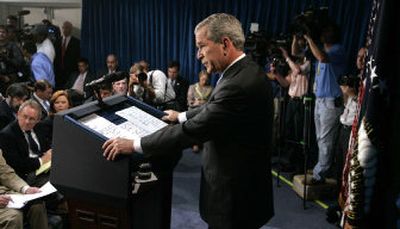Analysis: Change in Iraq rhetoric hints at growing pessimism

WASHINGTON – Of all the words that President Bush used at his news conference this week to defend his policies in Iraq, the one that did not pass his lips was “progress.”
For three years, the president tried to reassure Americans that more progress was being made in Iraq than they realized. But with Iraq either in civil war or on the brink of it, Bush dropped the unseen-progress argument in favor of the contention that things could be even worse.
The shifting rhetoric reflected a broader pessimism that has reached into even some of the most optimistic corners of the administration, a sense that the Iraq venture has taken a dark turn and will not be resolved anytime soon. Bush advisers once believed that if they met certain bench marks, such as building a constitutional democracy and training a new Iraqi army, the war would be won. And now, they feel they have more or less met those goals, yet the war rages on.
While still committed to the venture, officials have privately told friends and associates outside government that they have grown discouraged in recent months. Even the death of al-Qaida’s leader in Iraq proved not to be the turning point they expected, they have told associates, and other developments have been relentlessly dispiriting, with fewer signs of hope.
Bush acknowledged this week that he has been discouraged as well. “Frustrated?” he asked. “Sometimes I’m frustrated. Rarely surprised. Sometimes I’m happy. This is – but war is not a time of joy. These aren’t joyous times. These are challenging times, and they’re difficult times, and they’re straining the psyche of our country.”
Presidential counselor Dan Bartlett said Bush and his advisers still believe progress is being made and the war will be won. “No question about it, the last three months have been much more challenging,” Bartlett said. “Are we always going to be pleased with the pace? No. There are days that are frustrating. But is the overall direction going the right way? The answer to that is yes.”
With crucial midterm congressional elections just 2 1/2 months away, Bush and his team are trying to turn the public debate away from whether the Iraq invasion has worked out to what would happen if U.S. troops were withdrawn, as some Democrats advocate. Using terms such as “havoc,” Bush at Monday’s news conference made no effort to suggest the situation in Iraq is improving. Instead, he argued, “if you think it’s bad now, imagine what Iraq would look like if the United States leaves before this government can defend itself.”
Christopher Gelpi, a Duke University scholar whose research on public opinion in wartime has been influential in the White House, said Bush had little choice. “He looks foolish and not credible if he says, ‘We’re making progress in Iraq,’ ” Gelpi said. “I think he probably would like to make that argument, but because that’s not credible given the facts on the ground, this is the fallback. … If the only thing you can say is ‘Yes, it’s bad, but it could be worse,’ that really is a last-ditch argument.”
As recently as two weeks ago, Bush was still making the case that things in Iraq are better than they seem. The new Iraqi government, he said on Aug. 7, “has shown remarkable progress on the political front,” and its mere existence was “quite a remarkable achievement.”
Even now, the White House and Republican National Committee regularly send e-mails to supporters and journalists highlighting positive developments. U.S. Ambassador Zalmay Khalilzad published a piece in the Wall Street Journal on Wednesday arguing that a recent shift in security operations in Baghdad has shown “positive results,” and he said “this initial progress should give Iraqis, as well as Americans, hope about the future.”
But Bush has been ruminating on the different nature of Iraq and the battle with Islamic radicals and how hard it is to define victory. “Veterans of World War II and Korea will tell you we were able to measure progress based upon miles gained or based upon tanks destroyed or however people measured war in those days,” he said in a speech last week. “This is different … and it’s hard on the American people, and I understand that.”
Sen. John McCain, R-Ariz., a strong supporter of the war, suggested this week the Bush team has only itself to blame for setting unrealistic expectations. “One of the biggest mistakes we made was underestimating the size of the task and the sacrifices that would be required,” McCain said. ” ‘Stuff happens,’ ‘mission accomplished,’ ‘last throes,’ ‘a few dead-enders.’ I’m just more familiar with those statements than anyone else because it grieves me so much that we had not told the American people how tough and difficult this task would be.”
Through much of the war, Bush and his advisers focused on meeting bench marks laid out for rebuilding Iraq – writing a new constitution, electing a new parliament, bringing disaffected Sunnis into the government and training Iraqi troops. As long as those bench marks were met, the president had tangible events to point to as evidence of progress.
But the last step in that original timetable, election of a permanent parliament last December, has come and gone with no end to the violence. When Bush mentioned that election at his news conference, he depicted it not as progress but a sign that Iraqis want progress. “It’s an indication about the desire for people to live in a free society,” he said.